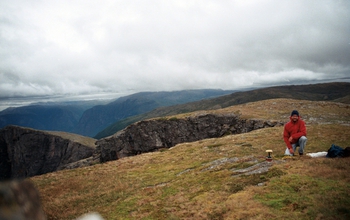![]()
Press Release 14-047
Investing in the future through the Graduate Research Fellowship Program![]()
Awards to 2,000 students cover a range of fields and institutions
|
GRF Fellow Adam Booth used GPS receivers to monitor movement of bedrock landslides in Norway. |
April 1, 2014
The National Science Foundation (NSF) has announced this year’s recipients of Graduate Research Fellowships (GRF). The graduate students awarded the GRF in 2014 represent a diverse group of scientific disciplines and come from all states and the District of Columbia, as well as commonwealths and territories of the United States. They are also a diverse group of individuals. Among the 2,000 awardees, 1,069 are women, 382 are from underrepresented minority groups, 55 are persons with disabilities, and 37 are veterans.
The Fellows in the 2014 class come from 442 baccalaureate institutions, 58 more than in 2010, when the program first began awarding 2,000 fellowships each year.
Since 1952, NSF has provided fellowships to individuals selected early in their graduate careers based on their demonstrated potential for significant achievements in science and engineering. The NSF Graduate Research Fellowship Program (GRFP) continues to be a critical part of NSF’s overall strategy in developing the globally-engaged workforce necessary to ensure the Nation’s leadership in advancing science and engineering research and innovation. A high priority for NSF and GRFP is increasing the diversity of the science and engineering workforce, including geographic distribution and the participation of women, underrepresented minorities, persons with disabilities, and veterans.
With its emphasis on support of individuals, GRFP offers fellowship awards directly to graduate students selected through a national competition. The GRFP provides three years of financial support within a five-year fellowship period ($32,000 annual stipend and $12,000 cost-of-education allowance to the graduate institution) for graduate study that is in a field within NSF’s mission and leads to a research-based master’s or doctoral degree.
Fellows may also be eligible for access to cyberinfrastructure resources through the NSF-supported Extreme Science and Engineering Discovery Environment (XSEDE) and for Facilitation Awards for Scientists and Engineers with Disabilities (FASED).
In addition, Fellows have the opportunity for international research collaborations through the Graduate Research Opportunities Worldwide (GROW) initiative. GRFP also supports NSF’s Career-Life Balance (CLB) Initiative. CLB supplemental funding may be awarded to sustain the research of active NSF Graduate Research Fellows who have been granted an NSF-approved medical deferral for dependent-care (family leave) situations.
The ranks of NSF Graduate Research Fellows include numerous individuals who have made transformative breakthroughs in science and engineering research, become leaders in their chosen careers, and been honored as Nobel laureates. Applicants must be U.S. citizens, nationals, or permanent residents and are selected through the NSF peer review process.
A complete list of those offered this fellowship for 2014 is available at the NSF website. General information about GRFP is available at the program website.
-NSF-
![]()
Media Contacts
Maria C. Zacharias, NSF, (703) 292-8454, mzachari@nsf.gov
Program Contacts
Gisele T. Muller-Parker, NSF, (703) 292-8694, gtmuller@nsf.gov
![]()
The National Science Foundation (NSF) is an independent federal agency that supports fundamental research and education across all fields of science and engineering. In fiscal year (FY) 2014, its budget is $7.2 billion. NSF funds reach all 50 states through grants to nearly 2,000 colleges, universities and other institutions. Each year, NSF receives about 50,000 competitive requests for funding, and makes about 11,500 new funding awards. NSF also awards about $593 million in professional and service contracts yearly.
Useful NSF Web Sites:
NSF Home Page: http://www.nsf.gov
NSF News: http://www.nsf.gov/news/
For the News Media: http://www.nsf.gov/news/newsroom.jsp
Science and Engineering Statistics: http://www.nsf.gov/statistics/
Awards Searches: http://www.nsf.gov/awardsearch/
![]()
